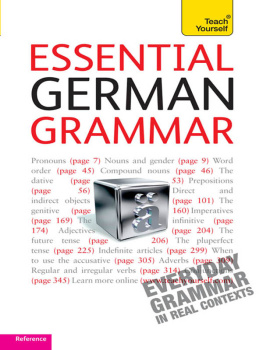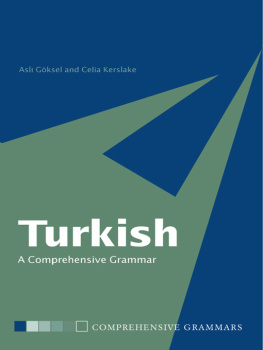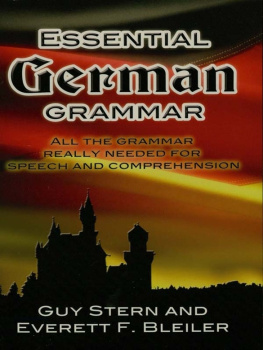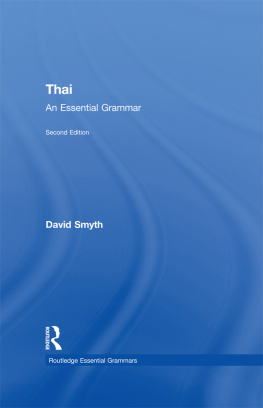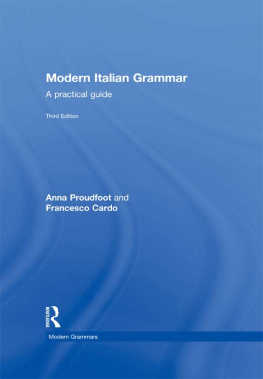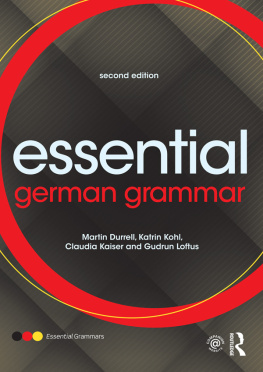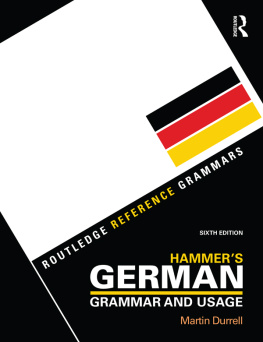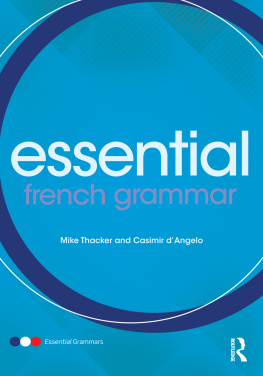Jenny Russ - Essential German Grammar: Teach Yourself
Here you can read online Jenny Russ - Essential German Grammar: Teach Yourself full text of the book (entire story) in english for free. Download pdf and epub, get meaning, cover and reviews about this ebook. year: 2011, publisher: Teach Yourself, genre: Children. Description of the work, (preface) as well as reviews are available. Best literature library LitArk.com created for fans of good reading and offers a wide selection of genres:
Romance novel
Science fiction
Adventure
Detective
Science
History
Home and family
Prose
Art
Politics
Computer
Non-fiction
Religion
Business
Children
Humor
Choose a favorite category and find really read worthwhile books. Enjoy immersion in the world of imagination, feel the emotions of the characters or learn something new for yourself, make an fascinating discovery.
- Book:Essential German Grammar: Teach Yourself
- Author:
- Publisher:Teach Yourself
- Genre:
- Year:2011
- Rating:3 / 5
- Favourites:Add to favourites
- Your mark:
Essential German Grammar: Teach Yourself: summary, description and annotation
We offer to read an annotation, description, summary or preface (depends on what the author of the book "Essential German Grammar: Teach Yourself" wrote himself). If you haven't found the necessary information about the book — write in the comments, we will try to find it.
Is this the right book for me?
Want to get more out of your study of German?
Essential German Grammar is an up-to-date introduction to German grammar. You dont need to know a lot about grammar before you start. Everything is explained simply and there are lots of examples to illustrate each point. Unlike more traditional grammars, Essential German Grammar is structured so that you can look up language forms according to what you want to say, even if you dont know the grammatical term for them. If you already know some grammar, then you can use the reference grammar section at the back of the book to look up the points you need.The course consists of 21 units illustrating the various uses to which the language can be put, for example, giving instructions or talking about the recent past. The more traditional reference grammar deals with grammatical structures, such as the imperative or the perfect tense. All grammatical terms are explained in the glossary at the back of the book. Each unit contains exercises for you to practise what you have learnt and there is a key at the back of the book for you to check your answers. The new page design in this edition means that the book is even easier to use and the main headings are in English so that you can find your way around the book quickly. This edition contains a taking it further section which will direct you to further sources of real German.
Essential German Grammar will help you to understand and manipulate German grammar with confidence because:
- you need no prior knowledge of grammatical terminology to use it;
- the approach is accessible and supportive;
- the examples are clear and in context;
- exercises help you practise every point.
Now in a brand new edition with new, easy-to-follow page design and interactive online features.
Essential German Grammar includes:
Chapter 1: Asking for and giving personal information
Chapter 2: Introducing and identifying people, places and things
Chapter 3: Expressing existence and availability
Chapter 4: Expressing location
Chapter 5: Talking about the present
Chapter 6: Expressing likes and dislikes
Chapter 7: Expressing wants and preferences
Chapter 8: Expressing permission and ability
Chapter 9: Expressing obligation and necessity
Chapter 10: Asking for and giving opinions
Chapter 11: Talking about habitual actions Chapter 12: Expressing possession
Chapter 13: Giving directions and instructions
Chapter 14: Making requests and offers
Chapter 15: Describing people, places and things
Chapter 16: Referring to future plans and events
Chapter 17: Describing the past
Chapter 18: Talking about the past
Chapter 19: Describing processes and procedures
Chapter 20: Reporting what was said and asked
Chapter 21: Expressing conditions
Reference: grammar
Learn effortlessly with a new easy-to-read page design and interactive features:
Not got much time?
One, five and ten-minute introductions to key principles to get you started.
Author insights
Lots of instant help with common problems and quick tips for success, based on the authors many years of experience.
Test yourself
Tests in the book and online to keep track of your progress.
Extend your knowledge
Extra online articles to give you a richer understanding of the subject.
Five things to remember
Quick refreshers to help you remember the key facts.
Try this
Innovative exercises illustrate what youve learnt and how to use it.
Jenny Russ: author's other books
Who wrote Essential German Grammar: Teach Yourself? Find out the surname, the name of the author of the book and a list of all author's works by series.

